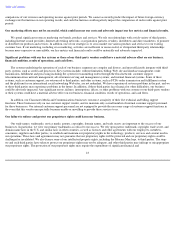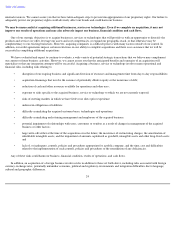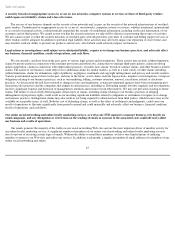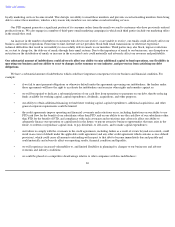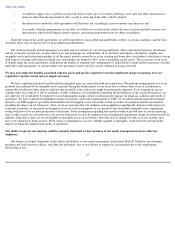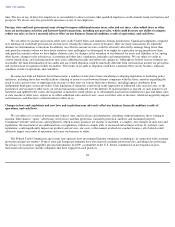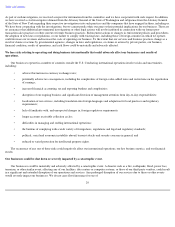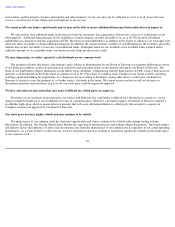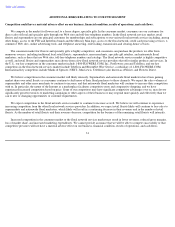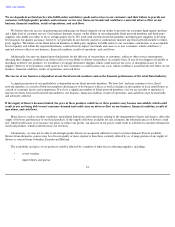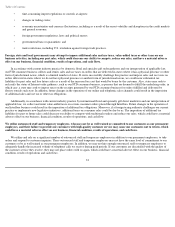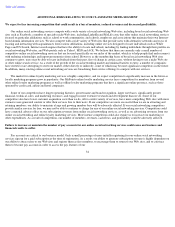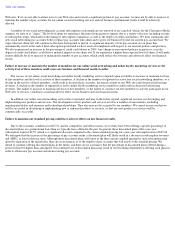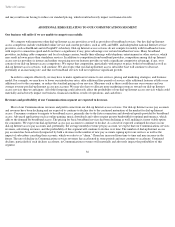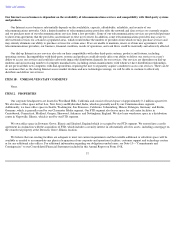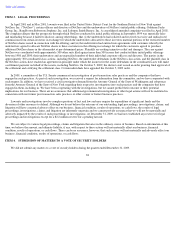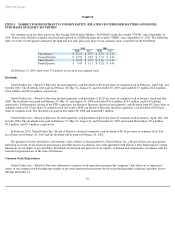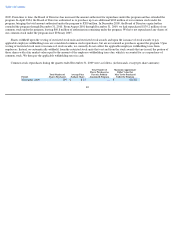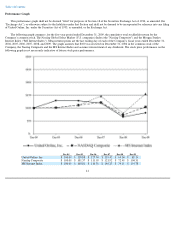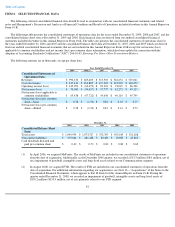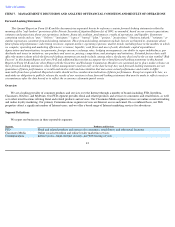Classmates.com 2009 Annual Report Download - page 34
Download and view the complete annual report
Please find page 34 of the 2009 Classmates.com annual report below. You can navigate through the pages in the report by either clicking on the pages listed below, or by using the keyword search tool below to find specific information within the annual report.
Table of Contents
• time-consuming import regulations or controls at airports;
•
changes in trading status;
•
economic uncertainties and currency fluctuations, including as a result of the recent volatility and disruptions in the credit markets
and general economy;
•
foreign government regulations, laws and political unrest;
•
governmental bans or quarantines; and
• trade restrictions, including U.S. retaliation against foreign trade practices.
Foreign, state and local governments may attempt to impose additional sales and use taxes, value-added taxes or other taxes on our
business activities, including our past sales, which could decrease our ability to compete, reduce our sales, and have a material adverse
effect on our business, financial condition, results of operations, and cash flows.
In accordance with current industry practice by domestic floral and specialty gift order gatherers and our interpretation of applicable law,
our FTD consumer business collects and remits sales and use taxes on orders that are delivered in states where it has a physical presence or other
form of jurisdictional nexus, which is a limited number of states. If states successfully challenge this practice and impose sales and use taxes on
orders delivered in states where we do not have physical presence or another form of jurisdictional nexus, we could incur substantial tax
liabilities for past sales and lose future sales as a result of the increased tax cost that would be borne by the customer. Also, states may seek to
reclassify the status of Internet order gatherers, such as our FTD consumer business, as persons that are deemed to fulfill the underlying order, in
which case, a state may seek to impose taxes on the receipts generated by our FTD consumer business for orders fulfilled and delivered by
florists outside such state. In addition, future changes in the operation of our online and telephonic sales channels could result in the imposition
of additional sales and use tax or other tax obligations.
Additionally, in accordance with current industry practice by international floral and specialty gift direct marketers and our interpretation of
applicable law, we collect and remit value-added taxes on certain consumer orders placed through Interflora. Future changes in the operation of
our Interflora business could result in the imposition of additional tax obligations. Moreover, if a foreign taxing authority challenges our current
practice or implements new legislative initiatives, additional taxes on consumer sales could be due by us. The imposition of additional tax
liabilities for past or future sales could decrease our ability to compete with traditional retailers and reduce our sales, which could have a material
adverse effect on our business, financial condition, results of operations, and cash flow.
We utilize outsourced staff and temporary employees, who may not be as well trained or committed to our customers as our permanent
employees, and their failure to provide our customers with high-quality customer service may cause our customers not to return, which
could have a material adverse effect on our business, financial condition, results of operations, and cash flows.
We utilize and rely on a significant number of outsourced staff and temporary employees in addition to our permanent employees, to take
orders and respond to customer inquiries. These outsourced staff and temporary employees may not have the same level of commitment to our
customers or be as well trained as our permanent employees. In addition, we may not hire enough outsourced staff or temporary employees to
adequately handle the increased volume of telephone calls we receive during peak periods. If our customers are dissatisfied with the quality of
the customer service they receive, they may not place orders with us again, which could have a material adverse effect on our business, financial
condition, results of operations and cash flows.
33


